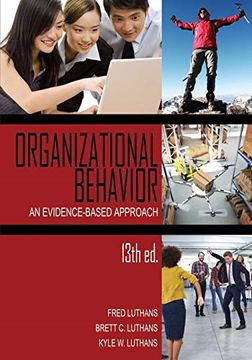Organizational Behavior: An Evidence-Based Approach, 13Th ed. (in English)
Synopsis "Organizational Behavior: An Evidence-Based Approach, 13Th ed. (in English)"
Our goal with this 13th Edition is to keep this first mainline organizational behavior text up-todate with the latest and relevant theory building, basic and applied research, and the best-practice applications. We give special recognition of this scientific foundation by our subtitle¬--An Evidence-Based Approach. As emphasized in the introductory chapter, the time has come to help narrow the theory/research-effective application/practice gap. This has been the mission from the beginning of this text. As "hard evidence" for this theory/research based text, we can say unequivocally that no other organizational behavior text has close to the number of footnote references. For example, whereas a few texts may have up to 40 or even 50 references for a few chapters, all the chapters of this text average more than twice that amount. This edition continues the tradition by incorporating recent breakthrough research to provide and add to the evidence on the theories and techniques presented throughout. Two distinguishing features that no other organizational behavior textbook can claim are the following: 1) We are committed at this stage of development of the field of OB to a comprehensive theoretical framework to structure our text. Instead of the typical potpourri of chapters and topics, there is now the opportunity to have a sound conceptual framework to present our now credible (evidence-based) body of knowledge. We use the widely recognized, very comprehensive social cognitive theory to structure this text. We present the background and theory building of this framework in the introductory chapter and also provide a specific model (Figure 1.5) that fits in all 14 chapters. Importantly, the logic of this conceptual framework requires two chapters not found in other texts and the rearrangement and combination of several others. For example, in the opening organizational context part there is Chapter 4, "Reward Systems," and in the cognitive processes second part, Chapter 7, "Positive Organizational Behavior and Psychological Capital," that no other text contains. 2) The second unique feature reflects our continuing basic research program over the years. Chapter 7 contains our most recent work on what we have termed "Positive Organizational Behavior" and "Psychological Capital" (or PsyCap). [The three of us introduced the term "Psychological Capital" in our joint article in 2004]. To meet the inclusion criteria (positive; theory and research based; valid measurement; open to development; and manage for performance improvement), for the first time the topics of optimism, hope, happiness/subjective well-being, resiliency, emotional intelligence, selfefficacy, and our overall core construct of psychological capital have been given chapter status. Just as real-world management can no longer afford to evolve slowly, neither can the academic side of the field. With the uncertain, very turbulent environment most organizations face today, drastically new ideas, approaches, and techniques are needed both in the practice of management and in the way we study and apply the field of organizational behavior. This text mirrors these needed changes. Social Cognitive Conceptual Framework. The book contains 14 chapters in four major parts. Social cognitive theory explains organizational behavior in terms of both environmental, contextual events and internal cognitive factors, as well as the dynamics and outcomes of the organizational behavior itself. Thus, Part One provides the evidence-based and organizational context for the study and application of organizational behavior.

